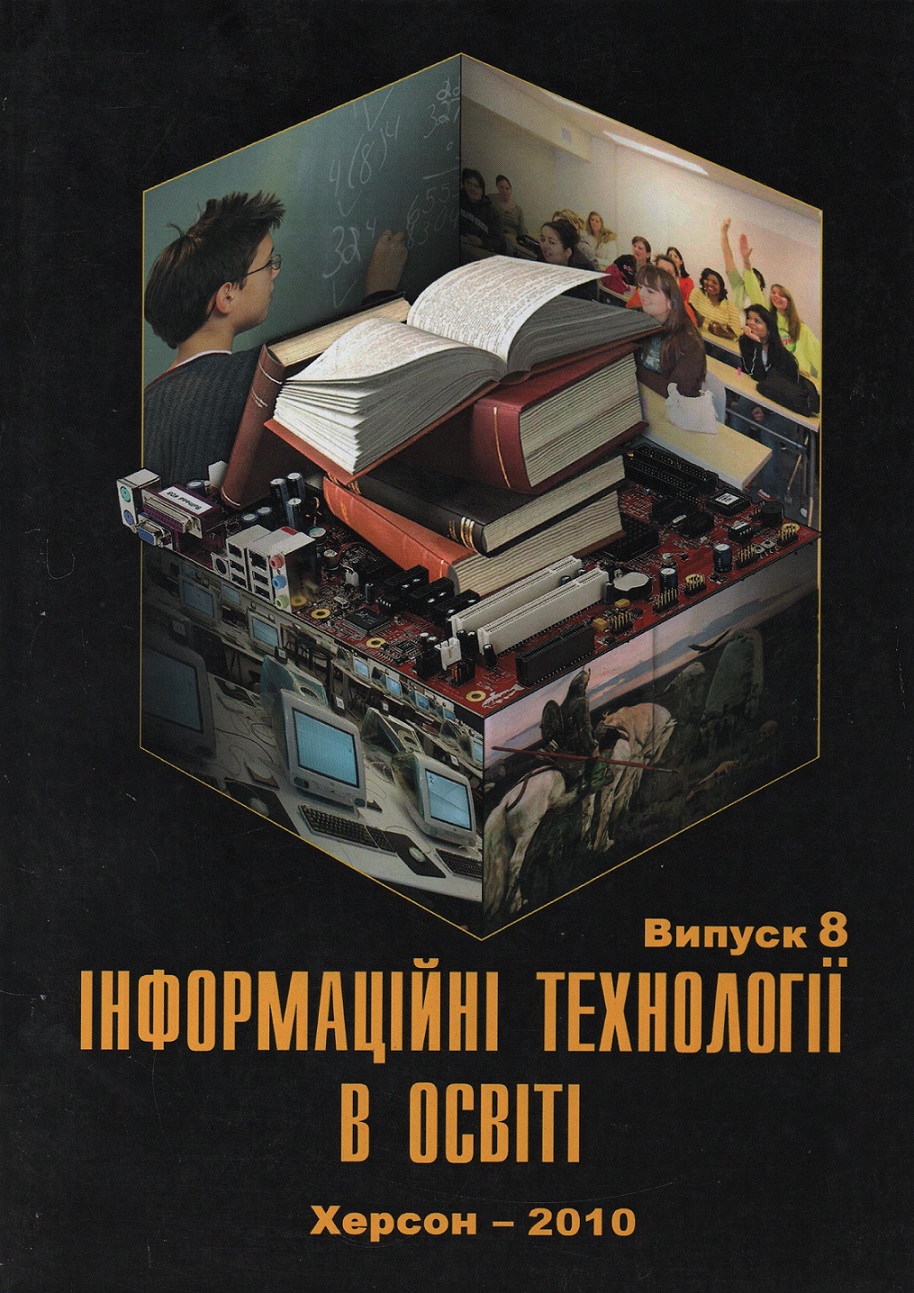TESTING AS THE BASIC TECHNOLOGY OF THE KNOWLEDGE CONTROL OF LISTENERS OF COURSE ECDL
DOI:
https://doi.org/10.14308/ite000201Keywords:
distance learning and testing, distance learning system «ECDL», improvements of professional skill, Standard ECDLAbstract
Results of research of distance testing systems and their introduction for the knowledge control in the course of professional skill improvement under program ECDL with use of distance learning are presented.
Downloads
Download data is not yet available.
Metrics
Metrics Loading ...
References
<uk>
1. Сайт порталу ECDL Україна . – http://www.ecdl.com.ua.
2. Осипова Н.В., Кушнір Н.О. Особливості створення Інтернет-порталу дистанційного навчання ECDL для вищих навчальних закладів // Інформаційні технології в освіті. Випуск 4. – Херсон. – 2010. – С. 157 – 163.
3. Курганская Г.С. Система дифференцированного обучения через Интернет / Курганская Г.С. – Иркутск: Изд-во ИГУ, 2000. – 103 с.
4. H. Kravtsov, D. Kravtsov. Knowledge Control Model of Distance Learning System on IMS Standard // Innovative Techniques in Instruction Technology, E-learning, E-assessment, and Education. – Springer. – 2008. – P.195 – 198.
5. Сметанюк Л.В., Кравцов Г.М. К теории и практике использования адаптивных тестов. - Інформаційні технології в освіті. Випуск 3. – Херсон. – 2009. – С. 148 – 155.
6. Gnedkova O., Kravtsov D. Organization of Testing in Distance Learning (on the base of Distance Learning System “Kherson Virtual University, 2.0”). - Інформаційні технології в освіті. Випуск 3. – Херсон. – 2009. – С. 209 – 215.
7. Биков В.Ю., Кухаренко В.М., Сиротенко Н.Г., Рибалко О.В., Богачков Ю.М. Технологія розробки дистанційного курсу: Навчальний посібник / За ред. В.Ю. Бикова та В.М. Кухаренка – К.: Міленіум, 2008. – 324 с.
</uk>
<en>
1. Sajt portalu ECDL Ukrajina . – http://www.ecdl.com.ua.
2. Osipova N.V., Kushnir N.O. Osoblivosti stvorennja Internet-portalu distancijnogo navchannja ECDL dlja vishhix navchal'nix zakladiv // Informacijni texnologiji v osviti. Vipusk 4. – Xerson. – 2010. – S. 157 – 163.
3. Kurganskaja G.S. Sistema differencirovannogo obuchenija cherez Internet / Kurganskaja G.S. – Irkutsk: Izd-vo IGU, 2000. – 103 s.
4. H. Kravtsov, D. Kravtsov. Knowledge Control Model of Distance Learning System on IMS Standard // Innovative Techniques in Instruction Technology, E-learning, E-assessment, and Education. – Springer. – 2008. – P.195 – 198.
5. Smetanjuk L.V., Kravcov G.M. K teorii i praktike ispol'zovanija adaptivnyx testov. - Informacijni texnologiji v osviti. Vipusk 3. – Xerson. – 2009. – S. 148 – 155.
6. Gnedkova O., Kravtsov D. Organization of Testing in Distance Learning (on the base of Distance Learning System “Kherson Virtual University, 2.0”). - Informacijni texnologiji v osviti. Vipusk 3. – Xerson. – 2009. – S. 209 – 215.
7. Bikov V.Ju., Kuxarenko V.M., Sirotenko N.G., Ribalko O.V., Bogachkov Ju.M. Texnologija rozrobki distancijnogo kursu: Navchal'nij posibnik / Za red. V.Ju. Bikova ta V.M. Kuxarenka – K.: Milenium, 2008. – 324 s.
</en>
1. Сайт порталу ECDL Україна . – http://www.ecdl.com.ua.
2. Осипова Н.В., Кушнір Н.О. Особливості створення Інтернет-порталу дистанційного навчання ECDL для вищих навчальних закладів // Інформаційні технології в освіті. Випуск 4. – Херсон. – 2010. – С. 157 – 163.
3. Курганская Г.С. Система дифференцированного обучения через Интернет / Курганская Г.С. – Иркутск: Изд-во ИГУ, 2000. – 103 с.
4. H. Kravtsov, D. Kravtsov. Knowledge Control Model of Distance Learning System on IMS Standard // Innovative Techniques in Instruction Technology, E-learning, E-assessment, and Education. – Springer. – 2008. – P.195 – 198.
5. Сметанюк Л.В., Кравцов Г.М. К теории и практике использования адаптивных тестов. - Інформаційні технології в освіті. Випуск 3. – Херсон. – 2009. – С. 148 – 155.
6. Gnedkova O., Kravtsov D. Organization of Testing in Distance Learning (on the base of Distance Learning System “Kherson Virtual University, 2.0”). - Інформаційні технології в освіті. Випуск 3. – Херсон. – 2009. – С. 209 – 215.
7. Биков В.Ю., Кухаренко В.М., Сиротенко Н.Г., Рибалко О.В., Богачков Ю.М. Технологія розробки дистанційного курсу: Навчальний посібник / За ред. В.Ю. Бикова та В.М. Кухаренка – К.: Міленіум, 2008. – 324 с.
</uk>
<en>
1. Sajt portalu ECDL Ukrajina . – http://www.ecdl.com.ua.
2. Osipova N.V., Kushnir N.O. Osoblivosti stvorennja Internet-portalu distancijnogo navchannja ECDL dlja vishhix navchal'nix zakladiv // Informacijni texnologiji v osviti. Vipusk 4. – Xerson. – 2010. – S. 157 – 163.
3. Kurganskaja G.S. Sistema differencirovannogo obuchenija cherez Internet / Kurganskaja G.S. – Irkutsk: Izd-vo IGU, 2000. – 103 s.
4. H. Kravtsov, D. Kravtsov. Knowledge Control Model of Distance Learning System on IMS Standard // Innovative Techniques in Instruction Technology, E-learning, E-assessment, and Education. – Springer. – 2008. – P.195 – 198.
5. Smetanjuk L.V., Kravcov G.M. K teorii i praktike ispol'zovanija adaptivnyx testov. - Informacijni texnologiji v osviti. Vipusk 3. – Xerson. – 2009. – S. 148 – 155.
6. Gnedkova O., Kravtsov D. Organization of Testing in Distance Learning (on the base of Distance Learning System “Kherson Virtual University, 2.0”). - Informacijni texnologiji v osviti. Vipusk 3. – Xerson. – 2009. – S. 209 – 215.
7. Bikov V.Ju., Kuxarenko V.M., Sirotenko N.G., Ribalko O.V., Bogachkov Ju.M. Texnologija rozrobki distancijnogo kursu: Navchal'nij posibnik / Za red. V.Ju. Bikova ta V.M. Kuxarenka – K.: Milenium, 2008. – 324 s.
</en>
Downloads
Published
29.11.2010
How to Cite
Kravtsov Г., & Sharko В. Д. (2010). TESTING AS THE BASIC TECHNOLOGY OF THE KNOWLEDGE CONTROL OF LISTENERS OF COURSE ECDL. Journal of Information Technologies in Education (ITE), (8), 031–038. https://doi.org/10.14308/ite000201
Issue
Section
Articles
License
This work is licensed under a Creative Commons Attribution-NonCommercial-ShareAlike 4.0 International License.






























